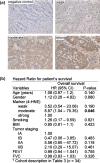Imbalance in redox status is associated with tumor aggressiveness and poor outcome in lung adenocarcinoma patients
- PMID: 24449404
- PMCID: PMC11823786
- DOI: 10.1007/s00432-014-1586-6
Imbalance in redox status is associated with tumor aggressiveness and poor outcome in lung adenocarcinoma patients
Abstract
Purpose: The expression levels of human antioxidant genes (HAGs) and oxidative markers were investigated in light of lung adenocarcinoma aggressiveness and patient outcome.
Methods: We assayed in vitro the tumoral invasiveness and multidrug resistance in human lung adenocarcinoma (AdC) cell lines (EKVX and A549). Data were associated with several redox parameters and differential expression levels of HAG network. The clinicopathological significance of these findings was investigated using microarray analysis of tumor tissue and by immunohistochemistry in archival collection of biopsies.
Results: An overall increased activity (expression) of selected HAG components in the most aggressive cell line (EKVX cells) was observed by bootstrap and gene set enrichment analysis (GSEA). In vitro validation of oxidative markers revealed that EKVX cells had high levels of oxidative stress markers. In AdC cohorts, GSEA of microarray datasets showed significantly high levels of HAG components in lung AdC samples in comparison with normal tissue, in advanced stage compared with early stage and in patients with poor outcome. Cox multivariate regression analysis in a cohort of early pathologic (p)-stage of AdC cases showed that patients with moderate levels of 4-hydroxynonenal, a specific and stable end product of lipid peroxidation, had a significantly less survival rate (hazard ratio of 8.87) (P < 0.05).
Conclusions: High levels of oxidative markers are related to tumor aggressiveness and can predict poor outcome of early-stage lung adenocarcinoma patients.
Conflict of interest statement
The authors declare none.
Figures



Similar articles
-
Caveolin-1 inhibits the proliferation and invasion of lung adenocarcinoma via EGFR degradation.Sci Rep. 2025 Jul 1;15(1):21654. doi: 10.1038/s41598-025-05259-8. Sci Rep. 2025. PMID: 40594106 Free PMC article.
-
Prognostic value of decreased GRK6 expression in lung adenocarcinoma.J Cancer Res Clin Oncol. 2016 Dec;142(12):2541-2549. doi: 10.1007/s00432-016-2244-y. Epub 2016 Sep 6. J Cancer Res Clin Oncol. 2016. PMID: 27601164 Free PMC article.
-
CD155 expression and co-expression with PD-L1 are not associated with poor prognosis in patients with stage II and III lung adenocarcinoma undergoing surgical resection.Int J Clin Oncol. 2025 Jul;30(7):1319-1330. doi: 10.1007/s10147-025-02771-9. Epub 2025 Apr 27. Int J Clin Oncol. 2025. PMID: 40287900
-
International association for the study of lung cancer/american thoracic society/european respiratory society international multidisciplinary classification of lung adenocarcinoma.J Thorac Oncol. 2011 Feb;6(2):244-85. doi: 10.1097/JTO.0b013e318206a221. J Thorac Oncol. 2011. PMID: 21252716 Free PMC article.
-
Outcome of patients with lung adenocarcinoma with transformation to small-cell lung cancer following tyrosine kinase inhibitors treatment: A systematic review and pooled analysis.Cancer Treat Rev. 2017 Sep;59:117-122. doi: 10.1016/j.ctrv.2017.07.007. Epub 2017 Jul 31. Cancer Treat Rev. 2017. PMID: 28806542
Cited by
-
Pleural effusion levels of DJ-1 are increased in elderly lung cancer patients with malignant pleural effusions.Redox Rep. 2015;20(6):254-8. doi: 10.1179/1351000215Y.0000000023. Epub 2015 Jun 30. Redox Rep. 2015. PMID: 26125099 Free PMC article.
-
MRPL51 is a downstream target of FOXM1 in promoting the malignant behaviors of lung adenocarcinoma.Oncol Lett. 2023 May 26;26(1):298. doi: 10.3892/ol.2023.13884. eCollection 2023 Jul. Oncol Lett. 2023. PMID: 37323822 Free PMC article.
-
Overexpression of glutathione peroxidase 1 predicts poor prognosis in oral squamous cell carcinoma.J Cancer Res Clin Oncol. 2017 Nov;143(11):2257-2265. doi: 10.1007/s00432-017-2466-7. Epub 2017 Jun 26. J Cancer Res Clin Oncol. 2017. PMID: 28653098 Free PMC article.
-
GPX1, a biomarker for the diagnosis and prognosis of kidney cancer, promotes the progression of kidney cancer.Aging (Albany NY). 2019 Dec 16;11(24):12165-12176. doi: 10.18632/aging.102555. Epub 2019 Dec 16. Aging (Albany NY). 2019. PMID: 31844035 Free PMC article.
-
Assessment of Glutathione Peroxidase-1 (GPX1) Gene Expression as a Specific Diagnostic and Prognostic Biomarker in Malignant Pleural Mesothelioma.Diagnostics (Basel). 2021 Dec 7;11(12):2285. doi: 10.3390/diagnostics11122285. Diagnostics (Basel). 2021. PMID: 34943522 Free PMC article.
References
-
- Blair SL, Heerdt P, Sachar S et al (1997) Glutathione metabolism in patients with non-small cell lung cancers. Cancer Res 57:152–155 - PubMed
-
- Brennan P, Fortes C, Butler J et al (2000) A multicenter case–control study of diet and lung cancer among non-smokers. Cancer Causes Control 11:49–58 - PubMed
-
- Burhans WC, Heintz NH (2009) The cell cycle is a redox cycle: linking phase-specific targets to cell fate. Free Radic Biol Med 47:1282–1293. doi:10.1016/j.freeradbiomed.2009.05.026 - PubMed
-
- Cairns RA, Harris IS, Mak TW (2011) Regulation of cancer cell metabolism. Nat Rev Cancer 11:85–95. doi:10.1038/nrc2981 - PubMed
-
- Castro MAA, Filho JLR, Dalmolin RJS et al (2009) ViaComplex: software for landscape analysis of gene expression networks in genomic context. Bioinformatics 25:1468–1469. doi:10.1093/bioinformatics/btp246 - PubMed
Publication types
MeSH terms
Substances
LinkOut - more resources
Full Text Sources
Other Literature Sources
Medical

